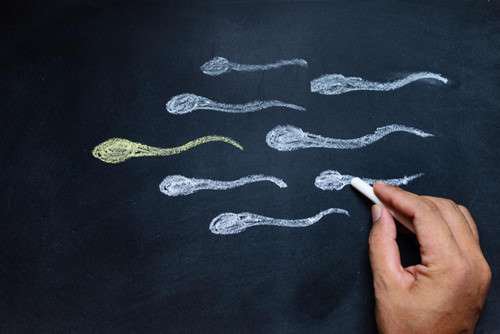Sperm is a vital component of human reproductive function. It is responsible for fertilizing the female egg, leading to conception. However, there seems to be a common misconception that sperm regenerates, much like some other bodily tissues. Let's explore whether this claim holds any truth.

The truth is that sperm doesn't regenerate in the same way as some other tissues in the body do. Unlike skin, blood cells, or even liver cells, which can regenerate, sperm is constantly produced in the testes through the process of spermatogenesis. Spermatogenesis is a complex, continuous, and dynamic process that occurs throughout a man's reproductive years.
During spermatogenesis, the testes produce millions of sperm cells every day. This production ensures a constant supply of mature and viable sperm for fertilization. The process starts with spermatogonial stem cells, which are undifferentiated cells that reside in the testes. These stem cells divide repeatedly, generating spermatocytes.
Each spermatocyte goes through meiosis, a type of cell division that results in the production of four haploid cells called spermatids. These spermatids then undergo further maturation and morphological changes, ultimately transforming into mature spermatozoa, commonly known as sperm cells.
Once the spermatozoa are fully matured, they are stored in the epididymis, a long coiled tube located behind each testicle. The epididymis serves as the storage and maturation site for sperm. When ejaculation occurs during sexual intercourse, these stored sperm are released and transported through the vas deferens and the urethra.
While it may seem like the loss of sperm through ejaculation leads to a depletion of sperm count, it's important to note that the constant production of sperm cells ensures an adequate supply is always available. However, certain factors such as age, overall health, lifestyle choices, and medical conditions can affect sperm quantity and quality.
In conclusion, the notion that sperm regenerates is a myth. Sperm is continually produced through spermatogenesis, a process that occurs within the testes. Understanding the science behind sperm production helps debunk this common misconception. If you have concerns about your sperm quantity or quality, it is advisable to consult a medical professional who can provide personalized guidance and advice.
To learn more about male reproductive health and the factors that influence sperm production, please consult a healthcare provider.
Related FAQs about does sperm regenerate
Can sperm regenerate?
No, sperm does not regenerate in the same way as some other bodily tissues. Sperm is constantly produced through spermatogenesis, a process that occurs in the testes.
How is sperm produced?
Sperm is produced through a process called spermatogenesis, which starts with spermatogonial stem cells that divide and differentiate into spermatocytes. These spermatocytes undergo meiosis to produce spermatids, which then mature into spermatozoa or sperm cells.
Do men run out of sperm?
No, men do not run out of sperm. Spermatogenesis ensures a continuous production of sperm throughout a man's reproductive years, providing a constant supply for fertilization.
Are lifestyle choices and health factors important for sperm production?
Yes, certain lifestyle choices, overall health, and medical conditions can have an impact on sperm production. Maintaining a healthy lifestyle, avoiding excessive alcohol and tobacco use, managing stress, and addressing any underlying health issues can help support optimal sperm quantity and quality.
When is it recommended to seek medical advice regarding sperm production?
If you and your partner have been actively trying to conceive for a year without success, it is recommended to consult a healthcare professional for further evaluation and guidance. They can assess various factors, including sperm quantity and quality, to determine the best course of action.
Glossary about does sperm regenerate
1. Spermatogenesis: Spermatogenesis is the process of sperm cell development in the testes of male organisms. It involves the production of mature sperm cells from spermatogonial stem cells through a complex series of cell divisions and maturation.
2. Spermatogonial Stem Cells: Spermatogonial stem cells are undifferentiated cells that reside in the testes and are responsible for initiating the process of spermatogenesis. These cells divide and differentiate into spermatocytes, which further develop into sperm cells.
3. Meiosis: Meiosis is a type of cell division that occurs during spermatogenesis, resulting in the production of four haploid cells called spermatids. It involves two rounds of division, leading to genetic diversity and the formation of mature sperm cells.
4. Epididymis: The epididymis is a long coiled tube located behind each testicle in the male reproductive system. It serves as a storage and maturation site for sperm. The sperm cells stored in the epididymis become fully mature and motile before ejaculation.
5. Vas Deferens: The vas deferens is a duct that carries mature sperm from the epididymis to the urethra during ejaculation. It is an essential part of the male reproductive pathway, ensuring the transport of sperm for fertilization.
6. Urethra: The urethra is a tube that carries both urine and semen out of the body. In males, it serves as the passageway for both urine from the bladder and sperm from the vas deferens during ejaculation.
7. Spermatozoa: Spermatozoa, commonly known as sperm cells, are the mature and motile form of male reproductive cells. They are specifically designed for fertilization of the female egg during sexual intercourse.
8. Testes: The testes, also referred to as testicles, are the male reproductive organs responsible for the production of sperm cells and testosterone. They are located within the scrotum, a pouch-like structure outside the body.
9. Ejaculation: Ejaculation is the process by which seminal fluid, including sperm cells, is forcefully expelled from the penis during sexual climax. It facilitates the delivery of sperm for potential fertilization.
10. Sperm Count: Sperm count refers to the number of sperm cells present in a given sample of semen. It is an essential factor in male fertility and can impact the chances of successful conception.
